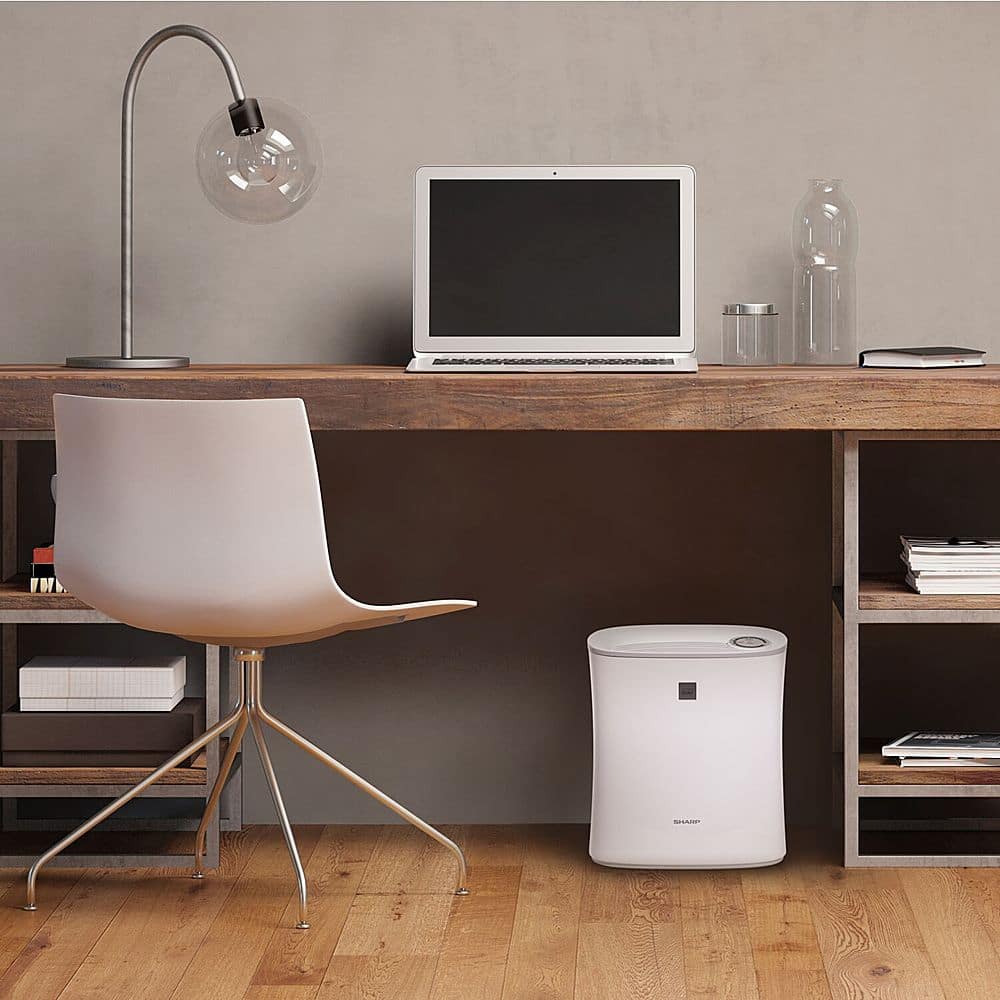Indoor air pollution is one of the top five environmental health risks, according to the Environmental Protection Agency (EPA). Poor indoor air quality (IAQ) can cause a variety of health problems, including headaches, fatigue, and respiratory illnesses. A small office air purifier can help improve IAQ by removing contaminants from the air.
If you have a small office, you might not think that an air purifier is necessary. However, there are many benefits to using one in your space. Here are just a few of the reasons why you should consider investing in a small office air purifier:
1. Air purifiers can remove pollutants from the air, including dust, pollen, and smoke particles. This can create a healthier environment for you and your employees.
2. Air purifiers can also help to reduce odors in your office space.
If you have smokers in your office or if someone always forgets to take out the garbage, an air purifier can help to eliminate those smells.
3. Air purifiers can also help to improve the quality of the air in your office. This means that it will be easier for everyone to breathe, and it can also help to reduce the spread of illnesses.
4. Investing in an air purifier shows that you care about creating a healthy work environment for your employees. This can improve morale and make everyone feel more comfortable coming into work each day.
If you’re looking for ways to improve the air quality in your small office, investing in a small office air purifier is a great option!

Credit: www.bestbuy.com
Should You Get an Air Purifier for Your Office?
An air purifier is a device that helps remove pollutants from the air in your home. These devices can help improve indoor air quality and reduce your exposure to airborne contaminants. While most homes have some form of ventilation, many still suffer from poor indoor air quality due to things like pet dander, dust mites, mold spores, and pollen.
There are a few different types of air purifiers on the market, and each one works slightly differently. The most common type of air purifier uses filters to capture pollutants as they pass through the device. HEPA (high-efficiency particulate arrestance) filters are the most effective at removing particles from the air, but they can also be more expensive than other types of filters.
Activated carbon filters are also effective at trapping pollutants and can be used in conjunction with HEPA filters for even better results.
If you’re considering an air purifier for your office, there are a few things you should keep in mind. First, decide what size unit you need based on the square footage of your space.
You’ll also want to consider how often you’ll be using the unit and whether or not you need a portable option. Some units require regular filter changes while others have self-cleaning features; choose a model that best fits your needs and lifestyle.
While there are many benefits to owning an air purifier, it’s important to note that they aren’t perfect solutions for every problem.
Air purifiers won’t remove all pollution from your indoor spaces, but they can greatly reduce levels of harmful contaminants. If you have concerns about indoor air quality in your office, speak with your supervisor or contact a professional specializing in IAQ (indoor air quality) testing and remediation.
Are Small Air Purifiers Worth It?
If you’re considering an air purifier for your home, you may be wondering if a small air purifier is worth the investment. The answer depends on a few factors, including the size of your home, the severity of your allergies or asthma, and your budget.
For homes up to 1,000 square feet, a small air purifier may be all you need to improve indoor air quality.
If you have severe allergies or asthma, however, you may need a larger unit to effectively remove allergens from the air. And if you have a large home or multiple rooms that need purifying, you may need more than one small unit.
The other factor to consider is cost.
Smaller units tend to be less expensive than larger ones, so if price is a concern, a small air purifier may be the way to go. Just be sure to do your research and choose a unit that’s right for your needs.
Where Should an Air Purifier Be Placed in an Office?
An air purifier can make a big difference in the quality of the air in your office, and it is important to choose the right location for it. The most effective way to clean the air is to place the purifier near where you spend the most time.
If your desk is in a corner, put the purifier on the desk next to you so that it can pull in air from all around you.
If you have an open floor plan, put it in the center of the room so that it can reach all areas equally.
You should also avoid placing your purifier too close to any vents or fans, as this can reduce its effectiveness. By following these tips, you can ensure that your office has clean and fresh air for everyone to enjoy.
Do Air Purifiers Work for Covid?
Since the outbreak of Covid-19, there has been a lot of speculation about the best way to protect oneself from the virus. Air purifiers have been touted as a possible solution, but do they really work?
The short answer is that air purifiers can help reduce your exposure to airborne particles, including viruses like Covid-19.
However, they are not 100% effective and should not be relied on as your sole means of protection.
Here’s a more detailed look at how air purifiers work and what they can (and can’t) do to help protect you from Covid-19.
How Air Purifiers Work
Air purifiers work by pulling in contaminated air and filtering out harmful particles. The most common type of air purifier uses an activated carbon filter, which is able to trap small particles like bacteria and viruses.
HEPA filters are another popular type of air purifier filter.
These are even more effective at trapping small particles than activated carbon filters, making them ideal for people with allergies or respiratory conditions. However, HEPA filters are generally more expensive than activated carbon filters.
Do Air Purifiers Protect Against Covid-19?
While air purifiers can help reduce your exposure to airborne contaminants like viruses, they are not 100% effective at eliminating all viruses from the air. In order for an air purifier to be most effective, it must be used in combination with other measures such as social distancing and wearing a face mask.
Everything an Air Purifier Can and Can't Do
Best Small Office Air Purifier for Covid
As the COVID-19 pandemic continues to spread, more and more people are looking for ways to protect themselves from the virus. One way to do this is by using an air purifier in your home or office.
There are many different types of air purifiers on the market, but not all of them are equally effective at removing viruses from the air.
In this blog post, we’ll take a look at the best small office air purifier for COVID-19, as well as some other important factors to consider when choosing an air purifier.
The first thing you need to know is that there are two main types of air purifiers: mechanical filters and electronic filters. Mechanical filters work by physically trapping particles like dust, pollen, and bacteria in a mesh or HEPA (high efficiency particulate air) filter.
Electronic filters use an electrical charge to attract and capture particles like viruses and smoke particles.
So, which type of filter is best for protecting against COVID-19? Studies have shown that mechanical filters are more effective at capturing and removing viruses from the air than electronic filters (1).
This means that a mechanical filter is your best bet for protecting yourself against COVID-19.
When it comes to finding the best small office air purifier for COVID-19, there are a few things you should keep in mind. First, make sure that the unit has a high CADR rating.
The CADR (clean Air Delivery Rate) is a measure of how much filtered air an air purifier can deliver per minute. The higher the CADR rating, the better.
Second, choose an air purifier with multiple filtration stages.
This will ensure that your unit can effectively remove both large and small particles from the air, including viruses like COVID-19. And finally, make sure you choose an energy-efficient model to help keep your operating costs low.
Conclusion
If you’re looking for a small office air purifier, you’ve come to the right place. In this blog post, we’ll go over the top five small office air purifiers on the market today. We’ll also give you a few tips on how to choose the right one for your needs.
The first thing you need to consider when choosing a small office air purifier is the size of your office. You want to make sure that the unit will be able to cover the entire space. The second thing you need to consider is what type of filter you need.
There are three basic types of filters: mechanical, activated carbon, and ozone generators.
Mechanical filters are great for removing large particles from the air, like dust and pollen. Activated carbon filters are good for removing VOCs (volatile organic compounds) and other chemicals from the air.
Ozone generators produce ozone gas that can help kill bacteria and viruses in the air.
Now that you know what to look for in a small office air purifier, let’s take a look at some of the best units on the market today:
1. The Blueair Pro XL Air Purifier is our top pick for a small office air purifier.
It features three different types of filters (mechanical, activated carbon, and ozone), so it can handle just about any type of contaminant in your office space. It also has a high CADR rating (Clean Air Delivery Rate), so it will do a great job of circulating clean air throughout your space.
2. The Austin Air HealthMate Jr Air Purifier is another great option for a small office space.
